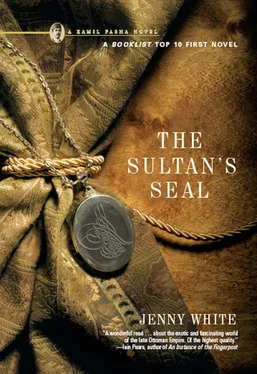Jenny White - The Sultan's seal
Здесь есть возможность читать онлайн «Jenny White - The Sultan's seal» весь текст электронной книги совершенно бесплатно (целиком полную версию без сокращений). В некоторых случаях можно слушать аудио, скачать через торрент в формате fb2 и присутствует краткое содержание. Жанр: Исторический детектив, на английском языке. Описание произведения, (предисловие) а так же отзывы посетителей доступны на портале библиотеки ЛибКат.
- Название:The Sultan's seal
- Автор:
- Жанр:
- Год:неизвестен
- ISBN:нет данных
- Рейтинг книги:5 / 5. Голосов: 1
-
Избранное:Добавить в избранное
- Отзывы:
-
Ваша оценка:
- 100
- 1
- 2
- 3
- 4
- 5
The Sultan's seal: краткое содержание, описание и аннотация
Предлагаем к чтению аннотацию, описание, краткое содержание или предисловие (зависит от того, что написал сам автор книги «The Sultan's seal»). Если вы не нашли необходимую информацию о книге — напишите в комментариях, мы постараемся отыскать её.
The Sultan's seal — читать онлайн бесплатно полную книгу (весь текст) целиком
Ниже представлен текст книги, разбитый по страницам. Система сохранения места последней прочитанной страницы, позволяет с удобством читать онлайн бесплатно книгу «The Sultan's seal», без необходимости каждый раз заново искать на чём Вы остановились. Поставьте закладку, и сможете в любой момент перейти на страницу, на которой закончили чтение.
Интервал:
Закладка:
“Unfortunately, these days one can’t count on rational thinking. There are other forces too, not under our control. Even in the palace. This is strictly between us,” he adds quickly.
“Of course. I wouldn’t breathe a word.”
Her pleasure at this confidence inspires him to continue. “The palace has destroyed other powerful people who became, shall we say, difficult. Besides, these things can be made to appear an accident. As you know, relations are strained between our governments. Some might wish them to deteriorate further. But I don’t mean to worry you, Sybil Hanoum. It was, perhaps, impolitic of me to speak of this to you. But I know how much you care for your father. Perhaps a word or two from you about being careful and always taking a retinue with him, his clerks, a dragoman, a few extra guards. There are other means of protecting oneself that are less obtrusive. I’d be happy to speak with him about it, if he’s so inclined.”
Distressed, Sybil shakes her head. “Father has never been careful. I’m sure his safety doesn’t concern him a bit. He has always lived just for his work,” she says sadly. “It’s as if he has put to bed all other parts of his mind, so that he has no distractions from his duties. But if you think it necessary, I’ll try to get him to take some precautions.”
Kamil understands from the flatness of her voice that her father, like his father, inhabits a land inaccessible to his family. He remembers a conversation he had with Bernie about Western and Eastern civilizations. Bernie argued that people in the West saw themselves as individuals, each with his own rights and responsibilities, in charge of a destiny of his own making. This could lead to sharing, if one had the same interests, or selfishness, if one did not. In the East, on the other hand, people were first and foremost members of their family, their tribe, their community. Their own desires were irrelevant; the solidarity and survival of the group paramount. Selfishness couldn’t occur, because there were no selves, only fathers and sons, mothers and daughters, husbands and wives. Bernie’s comparison seemed to make sense, at least in a general way, although Kamil could think of numerous exceptions, including himself. Yet he couldn’t deny that there was in Ottoman society a widespread belief in kismet and in the evil eye that brought misfortune. And family feeling was very strong.
Still, he remembered thinking that his fellow classmates at Cambridge, young Englishmen away from home for the first time, were not so dissimilar from the young men he knew at school at Galata Saray. One loved one’s parents, certainly. But once out from under their supervision, there was plenty of personal ambition and mischief. If, as the English say, ‘Boys will be boys,’ then why couldn’t ‘fathers be fathers,’ regardless of which society they belonged to? And here is Sybil, a representative of the individualistic West, tending to her father like any good Ottoman daughter.
“Perhaps you could simply be a fly in his ear. The important thing is to be aware of the risk.”
Sybil giggles. “A flea in his ear.”
“Ah, of course. Although I find that image, well, rather unappetizing. I think I’d prefer a fly in my ear.” Kamil laughs. “English expressions. I’ve never gotten used to them. I think you have to be born English.”
“It’s the same with Turkish sayings. You have sayings for everything. But even when someone explains them to me, I don’t understand them.”
“Oriental inscrutability. It’s what has kept us independent for so long. No one understands what we’re saying, so they can’t conquer us!”
The sun falling through the French doors has become hot and Sybil stands to draw the lace curtains. She sits again on the couch and, eyes lowered, adjusts and readjusts the folds of her dress. The room falls into a hush.
After a few moments, flustered, she raises her chin and says, “Oh, I promised you tea.”
“That would be lovely. Thank you.”
Sybil jumps up and runs to the velvet bellpull by the door. Her skirt catches Kamil’s leg as she passes. They wait in companionable silence for the tea to be brought. Each spark of conversation is muffled by the still, amber air, then extinguished, as if the air in the room is too thin to support speech. The click of fine china, the sough of tea poured, and the thin rap of spoons against the porcelain cups embracing their warm liquid take the place of conversation.
Sybil slides her cup and saucer onto the side table. They seem too fragile suddenly in her hand. She is excited about what she thinks of as her investigation, but also nervous about Kamil’s reaction.
“I saw Shukriye Hanoum, the woman who was engaged to Prince Ziya. She remembered Hannah.”
“I see.” He looks surprised. “Where did you find her?”
“She’s here in Istanbul. Her father is dying. She came to pay her last respects.”
She tells him about the death of Shukriye’s children, her accusations against her mother-in-law, and the young kuma.
“That’s barbaric. Did she tell you all this in front of the others? You said there were many visitors.”
“No. I joined her and her sister in a private room afterwards.”
“How did you manage that?” he asks, smiling and shaking his head at her audacity. “I thought you didn’t know them.”
“Asma Sultan and her daughter were there and, when they moved to another room, they took me along.”
“What did you learn about Hannah?”
“Shukriye and her sister Leyla remembered Hannah from their visits to Asma Sultan’s household where she was employed. I presume they were visiting Perihan, who seems to be a close friend. That surprised me, since Shukriye was engaged to the man Perihan loved. Perhaps Perihan is a more generous soul than she appears.”
Kamil smiles at the innocence of Sybil’s assessment. He knows better the unforgiving nature of royal intrigues that rage among the women as much as the men.
Sybil relates the conversation as she remembers it: Shukriye’s belief that the secret police were responsible for Prince Ziya’s death; Arif Agha’s discovery that Hannah was meeting someone every week.
Interrupting the easy lope of her story, Sybil pauses and reaches for her tea.
“A carriage?” he prompts her impatiently.
She sets the tea down, clattering the cup. “Yes. The eunuch told Asma Sultan that the driver had light-colored hair like a European, but tightly curled like an Arab’s. She thinks he might be a Kurd.”
At this, Kamil is speechless. Ferhat Bey had claimed to know nothing of the driver. Perhaps the eunuch had told the superintendent a different story. Too many links in this chain, Kamil thinks irritably, and he doesn’t know if one is connected to the next.
Sybil looks at him with a worried frown.
“Did they know where the carriage was going?” he asks brusquely.
“No.” Puzzled, she adds, “Asma Sultan said her eunuch told all this to the police.”
“The superintendent wasn’t as forthcoming as I would have liked,” he admits. “What else did you learn?”
“The women remembered Hannah wearing the silver pendant. They don’t remember Mary wearing it. I told them the pendant was made in the palace, with the sultan’s seal inside. They thought Hannah’s pendant must have been a gift, maybe from the person she visited every week, perhaps a lover. Or from someone in the harem.”
“You told them all this?” Kamil’s back is suddenly tense.
“It just came up in conversation,” Sybil equivocates uncomfortably. “Are you angry?”
“I’m not angry, Sybil Hanoum. I’m just very concerned.” To calm himself, he reaches for his cup. The tea has developed oily streaks on the surface but he draws it down his throat. The room is stifling hot.
Читать дальшеИнтервал:
Закладка:
Похожие книги на «The Sultan's seal»
Представляем Вашему вниманию похожие книги на «The Sultan's seal» списком для выбора. Мы отобрали схожую по названию и смыслу литературу в надежде предоставить читателям больше вариантов отыскать новые, интересные, ещё непрочитанные произведения.
Обсуждение, отзывы о книге «The Sultan's seal» и просто собственные мнения читателей. Оставьте ваши комментарии, напишите, что Вы думаете о произведении, его смысле или главных героях. Укажите что конкретно понравилось, а что нет, и почему Вы так считаете.












